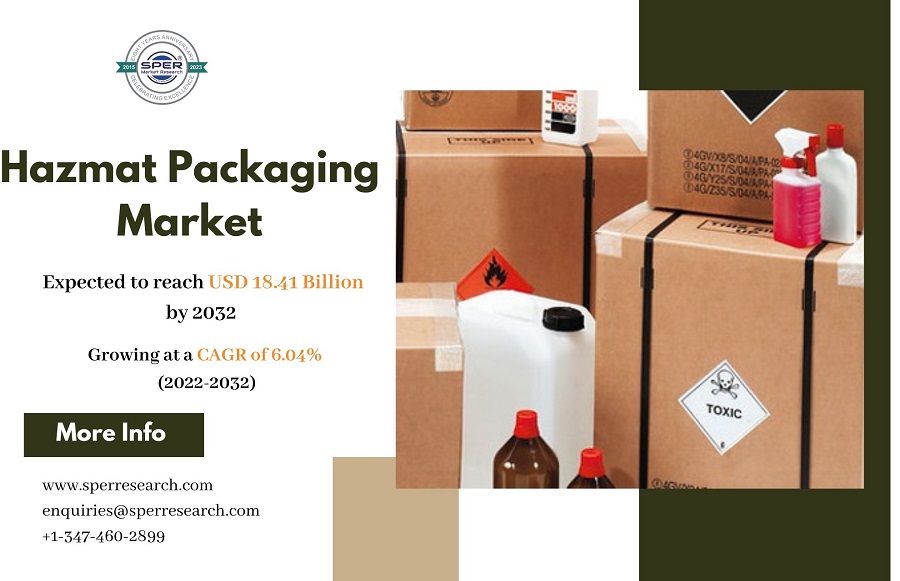Hazmat packaging is used to pack, store, and transport extremely dangerous flammable and explosive materials. These items can potentially be fatal, endangering workers’ health and safety as well as causing property damage. It requires the availability of things capable of transferring the contents safely and without spilling or leakage while adhering to the defined criteria. Increasing living standards, as well as higher discretionary spending, are supporting manufacturing industry growth, which is driving market value growth.
According to SPER market research, ‘Hazmat Packaging Market Size– By Product Type, By Material Type, By End User, By Class – Regional Outlook, Competitive Strategies and Segment Forecast to 2032’ state that the Hazmat Packaging Market is predicted to reach USD 18.41 billion by 2032 with a CAGR of 6.04%.
The increased use of plastic containers will drive the growth of the hazardous packaging sector over the predicted period. Hazmat packaging is a critical component in the transportation of hazardous goods or products. These materials or products have the potential to harm human health or the environment. Hazmat packaging is an excellent way to avoid these issues. It can be done in a variety of methods, including the use of industrial bulk containers, flexi tanks, pails, and drums. The use of these products in packaging is considered primary packaging. Corrugated boxes are frequently used for secondary packaging of hazardous chemicals.
The worldwide Hazmat packaging market is facing a number of challenging obstacles that will have an impact on its operation and growth. To begin with, tight regulations and compliance standards are a substantial impediment. Hazardous products must be packaged, labeled, and transported in conformity with complicated and constantly changing regulatory criteria. Companies in this industry must invest in compliance knowledge, which can be expensive and time-consuming.
Furthermore, safety and security are top priorities. Hazardous materials can endanger both human health and the environment.
Request For Free Sample Report @ https://www.sperresearch.com/report-store/hazmat-packaging-market.aspx?sample=1
COVID-19 is an unprecedented globally public health emergency that has impacted practically every business, and the long-term repercussions are projected to have an impact on the industry’s growth during the forecast period. Our present research widens our research paradigm to include fundamental COVID-19 concerns and potential next steps. The research gives insights on COVID-19 by taking into account consumer trends and demand, purchasing patterns, supply chain re-routing, the interconnections of current market forces, and important government interventions. The updated study contains insights, analysis, estimates, and forecasts based on the COVID-19 market impact.
Furthermore, the hazardous packaging market is examined in North America, Europe, Asia-Pacific, and Latin America. Because of large-scale manufacturing in countries such as China, India, and Vietnam, the Asia-Pacific region will account for the largest share of the worldwide hazmat packaging market in 2021. Furthermore, the region’s fast rising population and urbanization are considerably contributing to the rise of the chemical, pharmaceutical, and automotive sectors. Additionally, some of the market key players are Greif Inc., Hoover Ferguson Group, Inc., Mauser Group B.V., Eagle Manufacturing Company, Balmer Lawrie & Co. Ltd., Meyer Steel Drum, Inc., Hazmatpac, Inc., Air Sea Containers, Inc., Peninsula Drums, and Fibrestar Drums Limited.
For More Information, refer to below link:-
Hazmat Packaging Market Outlook
Related Reports:
Follow Us –
LinkedIn | Instagram | Facebook | Twitter
Contact Us:
Sara Lopes, Business Consultant – USA
SPER Market Research
+1-347-460-289974






